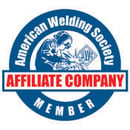Contract welding partners add substantial value, from providing skilled expertise to a critical discipline-specific process and providing the ability to gain on-demand expertise for your manufacturing process. Though the level of skill for a given industry reduces the number of contractors that can execute the project, there are multiple choices for an external welding partner. With that in mind, here are the three most important considerations when selecting a contract welding partner.
- Wide Range of Capabilities
There really is an art to welding. Two technicians can approach the same task with the same equipment, machine settings, and level of training, and achieve wildly different results.
The traditional processes (LBW (laser), GTAW (TIG), GMAW (MIG), SMA (stick) each carry varying approaches, benefits, and suitability for different applications. A complicated part may require multiple types of welding. Working with a contract welder that has proven capability in multiple areas increases the likelihood that they can complete the entire product assembly with high-quality processing techniques. - Highest Quality Standards
To ensure high-quality welding on the product, another important consideration for contract welding partners is that they have the highest quality standards. Industries such as medical, structural, aerospace, and those overseas often have strict guidelines to ensure joint integrity. These regulations exist for a variety of reasons, including safety, pressure capability, or structural integrity.
International and industry-specific certification bodies can help vet a contract welder for process quality. Selecting a partner with certifications such as ISO 9001:2015, AS9100, and Nadcap accreditation assures that a contract welding firm meets the process guidelines and provides sufficient documentation to adhere to industry standards. - Experience (with a Caveat)
The final consideration of a contract welding partner is to select a firm that has many years of experience with the process. However, the experience should be in the discipline you need. For example, selecting a partner with decades of experience GTA welding of stainless steel pressure vessels may not be the best choice for GTAW thin-gage aluminum.
Furthermore, the size on which a contract welder typically operates may not match up with your application. It is vital that the experience a welder has is with the industry, material, and size that you need.
Similar to selecting a partner with a wide range of capabilities, the welding firm should have a breadth of experience in varying material grades, gages, applications, and sizes.
Superior Joining Technologies, Inc. is ISO 9001:2015, AS9100, Nadcap 1100, AWS D17.1 and D1.1, ASTM E1417, and E1444 certified. They provide contract welding services for the aerospace and defense industries. Competencies include Gas Tungsten Arc Welding (GTAW), Laser Beam Welding (LBW), and Resistance Welding, in addition to 6-axis Laser Cutting and Laser Part Marking processes. SJTI is certified in ISO 9001:2015, NADCAP-accredited for PT, MT, GTAW and LBW, FAA Repair Station OP Spec for Fusion Welding, PT and MT.






